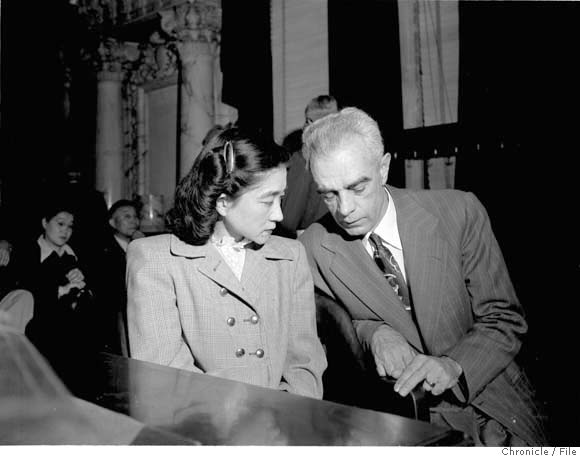
Wayne Collins
Wayne
Collins
Times of crisis sometimes reveal people of courage, compassion, and principle who profoundly affect, indeed transform, the lives of others. World War II was such a time. Vice Counsel of the Japanese Consulate in Lithuania, Chiune Sugihara, who issued transit visas to Jewish refugees fleeing Nazi terror, was such a man. In the United States, where innocent Japanese Americans were forced into barbed wire concentration camps, a civil rights attorney from San Francisco, Wayne Collins, who fought for the rights of Japanese Americans, was such a man. I am one of those whose life was changed by Wayne Collins. I often wonder what my life might have been like had it not been for the strong fight he mounted to regain my mother’s U.S. citizenship.
My family was incarcerated in Tule Lake, possibly the most intensely tempestuous of the ten concentration camps. Tule Lake was a high security camp holding people who had refused to answer the insidious questions of the so-called Loyalty Questionnaire as the government wanted. They had been goaded and provoked and tension was high. Tule Lake was a pressure cooker about to explode.
Into this situation, in the middle of a bloody war, the government threatened to close the camp and release the internees. The camp was convulsed with terror. Ironically, the barbed wire fences that confined them also protected them from the war crazed fanatics outside. Then, the government lit the fuse on an already incendiary situation. Congress passed the so called “denaturalization bill,” Public Law 405. It provided that an American citizen could renounce his or her citizenship on American soil in time of war. It was clearly unconstitutional. But renouncing one’s U.S. citizenship was the only way the government could be forced to maintain Tule Lake. My mother’s renunciation was an act of desperation to protect her family. But her daring sacrifice had backfired terribly. She was to be “deported” to Japan.
It was at this despairing point in our lives that Wayne Collins stepped in. He fought to get my mother a mitigation hearing saving her and her family from having to board the ship bound for a war ravaged Japan. Had we been on that ship, I might have grown up in Japan to become a very different man. Sometimes I tantalize myself with the “what if.” Wayne Collins made me who I am today.
Wayne Collins was born in Sacramento in 1900 but was reared and educated in San Francisco. There are so many interesting parallels in his life with that of my parents. My mother was born near Sacramento and my father was reared and educated in San Francisco. Collins held the U.S. Constitution sacred and my father held it dearly. The Takei family is American because of Wayne Collins. Our lives and our deep gratitude are bonded with him.
Collins was a fiery advocate for the rights of many Japanese Americans. He represented the Tule Lake Defense Committee from 1945 to 1960. His representation of the Committee included many issues. He mounted an epic struggle for the restoration of the citizenship of renunciants; the rights of those who were held in the “stockade,” a concrete prison within the Tule Lake camp; and to prevent the removal of the renunciants to Japan. Together with Ernest Besig of the American Civil Liberties Union, he challenged the internment all the way to the Supreme Court in 1944 with the Fred Korematsu, Minoru Yasui, and Gordon Hirabayashi cases.
Collins also defended Iva Toguri D’Aquino, who was unjustly accused of having broadcast propaganda for Japan as Tokyo Rose. Even after she was released from prison, he worked on getting a Presidential pardon for her, which she ultimately received from President Gerald Ford. He also fought for the rights of Japanese Peruvians, who had been kidnapped from Peru during the war and held in U.S. prison camps.
A passionate fighter for the rights of all underdogs, in 1964, he argued for the rights of the Berkeley Student Free Speech Movement.
In the encyclopedic tome on the internment, Years of Infamy: The Untold Story of America’s Concentration Camps, its author Michi Nishiura Weglyn states that Wayne Collins “… did more to correct a democracy’s mistakes than any other one person.” My gratitude and admiration for this extraordinary American is profoundly personal—I owe who I am to Wayne Collins.